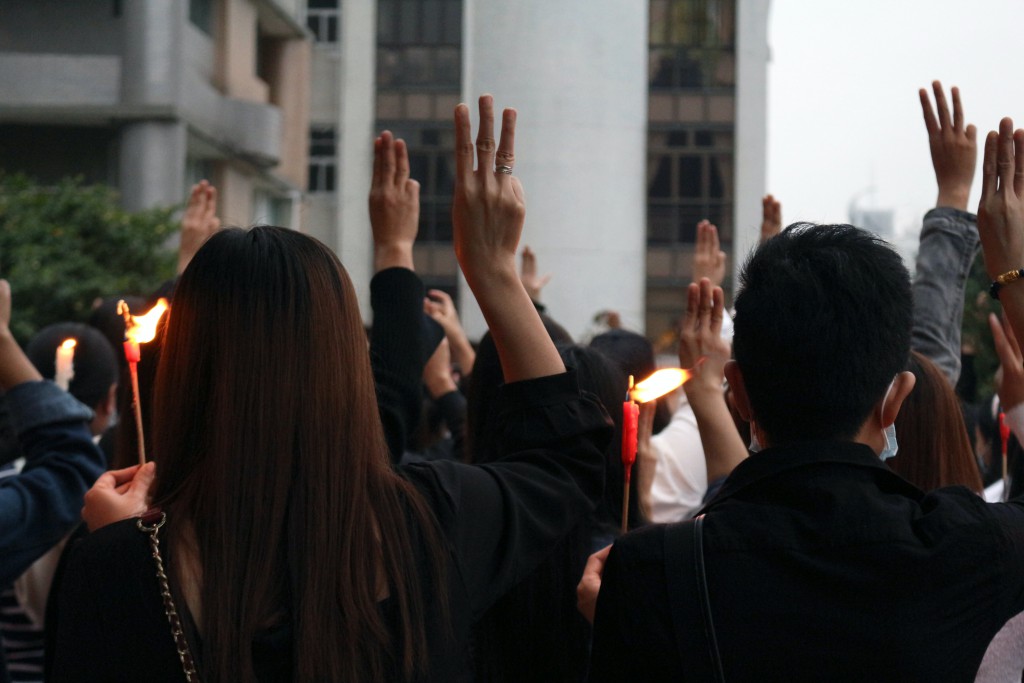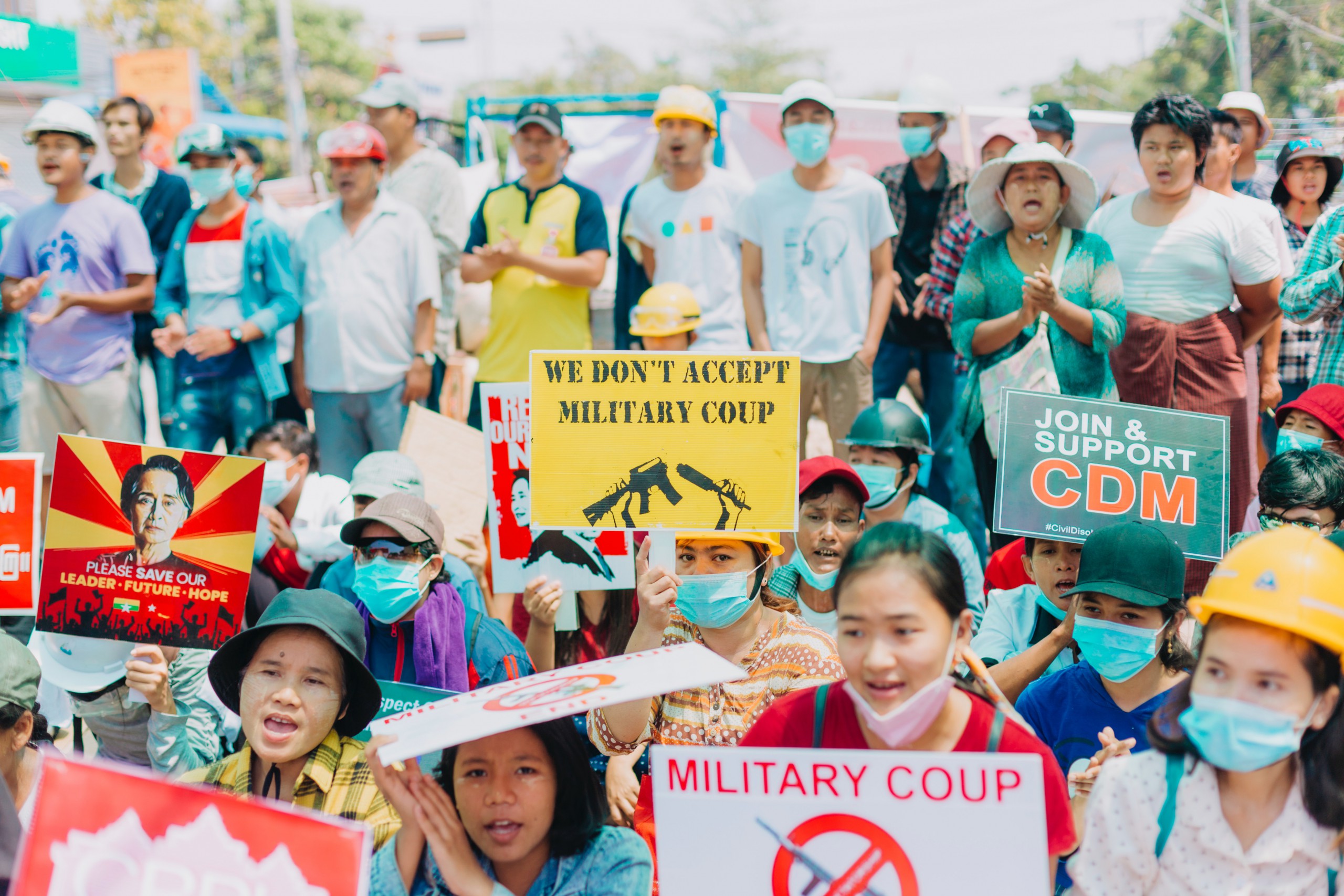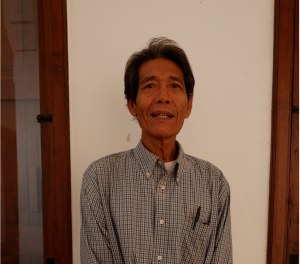On February 1st, 2021, Myanmar’s elected leader Aung San Suu Kyi, President Win Myint and other senior figures from the National League for Democracy (NLD) party were detained in an early morning raid. The military commander-in-chief Min Aung Hlaing is currently in power as the military declared a state of emergency and said it will rule for a year.
- Since the military seized control, mass protests have been taking place across Myanmar and dozens of protesters have been killed.
- The coup followed the 2020 election where the NLD party won and the opposition party (backed by the armed forces) demanded a rerun. The request was declined by the election commission due to lack of evidence.
- Suu Kyi, the elected leader, has been held at an unknown location. A secret trial for her and Win Myint began on February 16 with various charges, including illegal possession of walkie talkies, COVID-19 restriction violations during the election campaign, and publishing fear-triggering information.
How it all began
Back in September 2020, Myanmar government set a coronavirus lockdown in Yangon and other areas. But the election on November 8 will continue despite a warning from the UN human rights investigator to Myanmar, Thomas Andrews, that the polls will not meet the international standards due to the disenfranchisement of the Rohingyas.
The election commision also cancels voting in most of Rakhine State, where fighting with the rebel Arakan Army (AA) has killed and displaced thousands of people. Army chief Min Aung Hlaing warned the civilian government for making mistakes ahead of the election that will lead to potential bias in the vote.
Yet, on November 9th, 2021, NLD claimed victory in the parliamentary election, making Aung San Suu Kyi the elected leader. On the other hand, the military-backed Union Solidarity and Development Party (USDP) or the opposition party, demanded a rerun and called for the military help.
In January 2021, army military spokesman Brigadier General Zaw Min Tun warned that the military force will take action if the election dispute is not settled. But, the election commission declined allegations of vote fraud, saying that there were no significant errors to impact the credibility of the vote.
Pro-military demonstrations occurred in some major cities, including Yangon. On February 1st, 2021, the coup took place. Myanmar’s elected leader Aung San Suu Kyi, President Win Myint and other senior figures from the National League for Democracy (NLD) party were detained in an early morning raid. The military commander-in-chief Min Aung Hlaing is currently in power as the military declared a state of emergency and said it will rule for a year.

How the people reacted
The rapid turn of events have affected the country’s livelihood. Once declaring a state of emergency, the military took control of the country’s infrastructure, suspending most television broadcasts, suspending telephone and internet access in some major cities, and canceling domestic and international flights. The stock market and commercial banks were closed and long lines were seen outside ATMs in some places. Some residents even ran to the markets and stock up on food and necessary supplies.
The military restrained any response to the first waves of protestors, but as protests grew, there have been brutal efforts to put down the movement, leaving hundreds injured and some were killed.
On February 20th, two unarmed protesters were reportedly killed by security forces in Mandalay. More death occurred as a general strike followed on February 22nd, when millions of people across the country poured into the streets.It is said to be the largest protests since the Saffron Revolution in 2007, when thousands of monks fought against the military regime.
Among the protesters are teachers, lawyers, students, bank officers and even government workers. The national boycott has paralyzed the banking system, restraining the military to get much done. Week after week, the military, notorious for having crushed democracy movements in 1988 and 2007, has become more violent in its response to the protestors. By the end of March, more than 200 people were reportedly killed.
Despite attempts to terrorize and divide the mass, people across Myanmar have shown courage to fight back. Some used household items to ward off military violence in villages accompanied with songs of resistance. Students and youths were on the front lines of the pro-democracy protests against the military violence and internet shutdown.
People have also been showing generous acts of kindness to help each other. In Rakhine, for example, community members would offer a safe place to stay or share meals for those in need. In Yangon, some residents invited protestors into their homes when the military threw teargas.
What has the international reaction been to Myanmar
The United Nations secretary general, António Guterres, said that the coup developments represent a serious blow to democratic reforms in Myanmar. While Britain Prime Minister, Boris Johnson, said that the vote of the people must be respected and the civilian leaders to be released.
Following the escalation of Myanmar’s armed forces firing at unarmed demonstrators, the international community heavily criticized Myanmar’s leadership. Ravina Shamdasani, a spokeswoman with the United Nations human rights office, said, “We strongly condemn the escalating violence against protests in Myanmar and call on the military to immediately halt the use of force against peaceful protesters.”
The United States is still trying to contact Aung San Suu Kyi and other civilian detainees in Myanmar, according to the State Department. But the attempt has been rebuffed by the military.
In Southeast Asia, Malaysia Prime Minister Muhyiddin Yassin, supported Indonesia President Joko Widodo’s call for an emergency ASEAN summit to address the crisis in Myanmar. A dialogue is urged to restore peace, democracy, and stability in Myanmar.
As of now, there are still no immediate and concrete actions that other nations might take. But, the international community is staying alert on Myanmar and international institutions have been deliberating the situation.
Source:
https://www.aljazeera.com/news/2021/2/1/myanmar-military-rule-to-fragile-democracy
https://www.voanews.com/east-asia-pacific/timeline-recent-events-myanmar





















